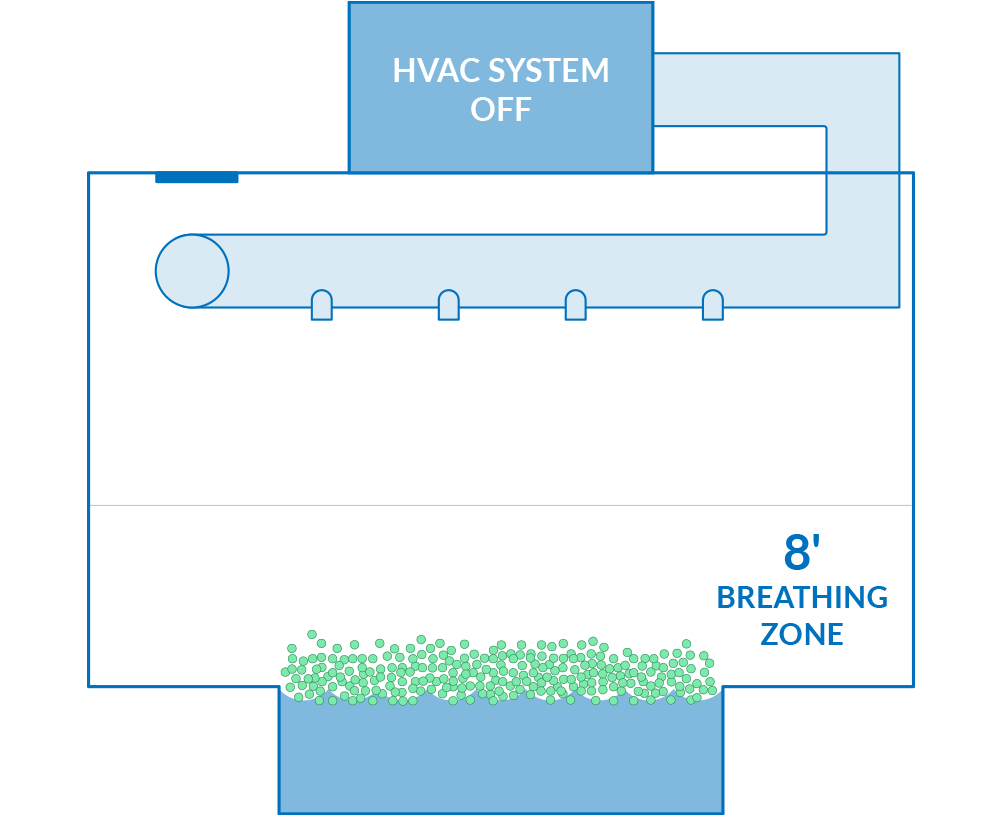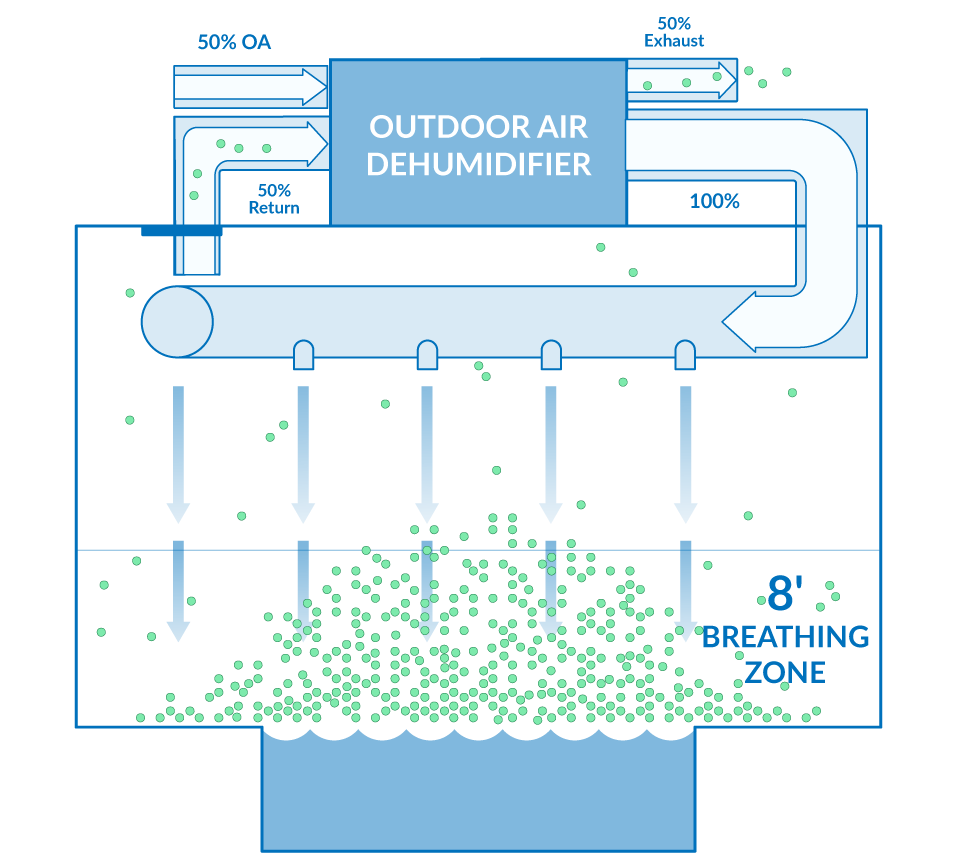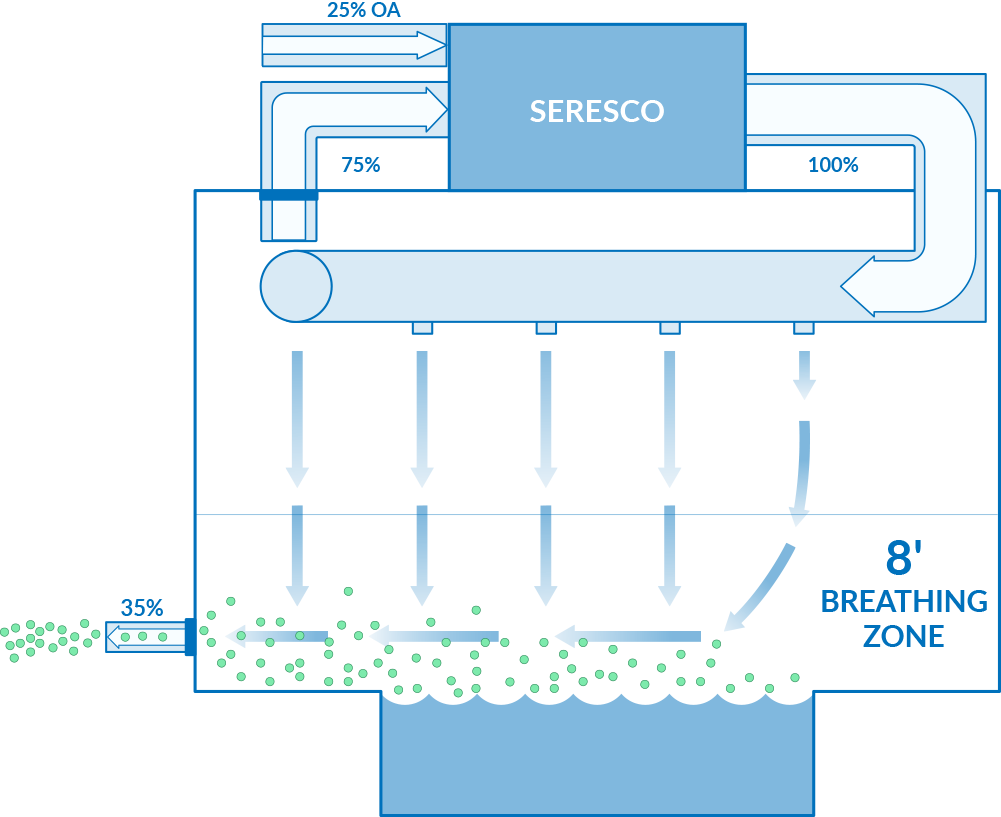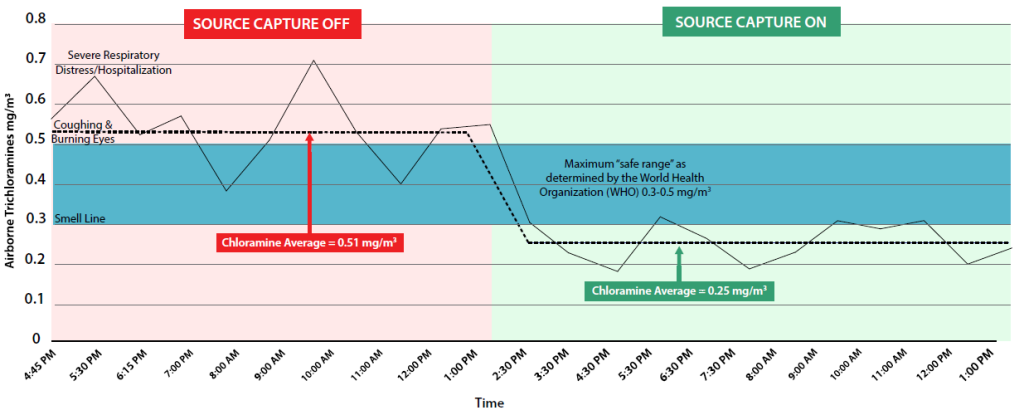Home » Dilution vs. Source Capture dehumidification
Dilution vs. Source Capture
Comparing energy costs, performance, and indoor air quality.
Energy Cost
Source Capture results in up to
cost savings over a 15 year lifespan.
Which could represent as high as
savings per year.
This is more than
the cost of new equipment.
Indoor Air Quality
Source capture is
as effective as dilution at removing chloramines.
Source capture has been measured to reduce chloramines to below World Health Organization defined maximum “safe range”.
The difference between Dilution and Source Capture
1. Indoor Air Quality Comparison
Chloramines are 4 times denser than air, leading them to settle on the pool surface or “breathing zone”, like a layer of scum, in the absence of any air disturbance.

The Dilution approach to indoor air quality requires bringing in large volumes of outside air, targeting the pool surface. This causes the chloramine layer to be disturbed and absorbed into the rest of the room, leading to poor indoor air quality (IAQ). The chloramines are then partially exhausted.

Source Capture introduces a gentle air current at the pool surface level, which exhausts the chloramine-laden air “at the source”, without distributing the chloramines throughout the pool room. Dehumidifiers manufactured by Seresco can be specified with the Source Capture ready option.

2. Effect of Source Capture on Nitrogen Trichloride (NCL3) at a YMCA by Purdue University
Using Source Capture rapidly brings trichloramine levels well below the safe range as determined by the World Health Organization (WHO)

*Paddock Pool Equipment Company, Inc. Study of Source Capture of Airborne Chloramines. Paddock Pool Equipment Company, Inc., 2010. PDF.
3. Cost Savings Analysis
There is a significant operating cost penalty in using the Dilution approach due to the large amounts of outdoor air beyond what codes require being introduced. Source capture allows you to operate at code minimums while delivering lower chemical levels. When the equipment operates at minimums and optimizes the use of outdoor air and compressor operation, there are significant energy savings. Calculations are based on ASHRAE climate data.
0.4% DB/MCWB
| Dilution (constant outside air) | Dilution (constant outside air and compressor) | Source capture (compressor and optimized ventilation) | Compressor HP | Anuual savings | % reduction using source capture | |
|---|---|---|---|---|---|---|
| Denver | $ 66,952 | $ 70,034 | $ 43,481 | 20 | $ 26,553 | 40% |
| Minneapolis | $ 66,213 | $ 68,830 | $ 47,801 | 46 | $ 21,029 | 32% |
| Washington DC | $ 62,558 | $ 65,640 | $ 45,836 | 46 | $ 19,804 | 32% |
| Chicago | $ 64,493 | $ 66,945 | $ 46,611 | 46 | $ 20,334 | 32% |
| Atlanta | $ 59,464 | $ 66,845 | $ 45,353 | 38 | $ 21,492 | 36% |
| Dallas | $ 57,979 | $ 65,360 | $ 45,308 | 38 | $ 20,052 | 35% |
| Boston | $ 60,363 | $ 61,476 | $ 42,236 | 30 | $ 19,240 | 32% |
| Los Angeles | $ 58,405 | $ 58,617 | $ 37,904 | 20 | $ 20,713 | 35% |
| Average | $ 62,053.38 | $ 65,468.38 | $ 44,316.25 | Average reduction using source capture | $ 21,152.13 | 34% |
calculations are based on ASHRAE climate data.
Common Myths of the Dilution Approach
The following myths used to sell 100% outside air (OA) can cost you money, while yielding disappointing IAQ and overall comfort.
Using Outside Air alone provides energy savings over using compressors for humidity control
Calculations we’ve seen which show Outside Air to be more energy ecient incorrectly assume that compressors are operating at 100% 24/7, 365 days a year. Operating costs are 34% lower on average with Source Capture compared to Dilution (Refer to the table above)
Geography strongly affects how feasible and energy effcient Outside Air is, but there are savings to the compressor and optimized ventilation approach even in mild climates like Los Angeles (Refer to the table above)
A vast majority (>90%) of successful installations use a combination of both to ensure year-round comfort and energy savings
Dilution by bringing in more Outside Air than the code requires results in good Indoor Air Quality
Dilution’s impact on Indoor Air Quality depends on air distribution. Even when 100% Outdoor Air is supplied, if it is not properly distributed from the supply duct to the breathing zone, certain areas will continue to experience Air Quality issues
Source Capture chemical removal is not dependent on the supply air distribution to be eective, and has proven to bring chloramine levels below the World Health Organization “safe range” (Refer to the chart above)
The Benefits of the Source Capture Approach
The dilution air approach was mostly abandoned in the 80s when people discovered the compressorized approach to controlling their space delivered more reliable results and saved energy. Source capture delivers superior indoor air quality without the need for bringing in more outside air than the code requires.
